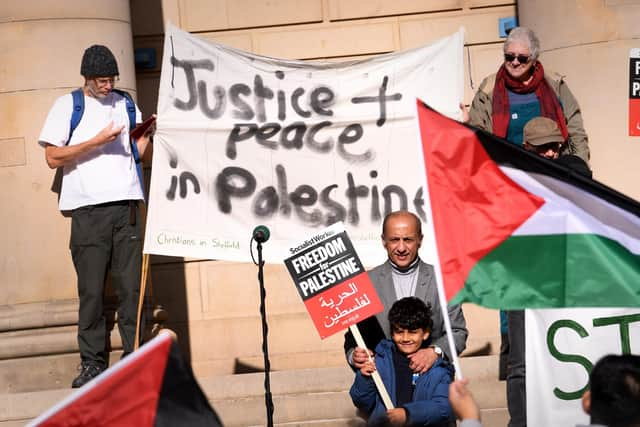How can we prevent intimidation without eroding the right to protest? - Dr Alan Billings
Last week, police chiefs were called to Downing Street and told that when protests were held outside MPs’ homes, for example, there should be an ‘immediate’ police response. This type of demonstration, the Prime Minister felt, was going too far. It seriously threatened our democratic traditions: people are entitled to make their views known through peaceful protest, but gathering outside an MP’s house was intimidatory and an attempt to influence an elected member by means other than reasoned debate and discussion.
The government is making £31m available to police forces to do more and act more quickly. Unsurprisingly, perhaps, the pro-Palestinian march organisers have reacted badly to the charge of ‘mob rule’ and organisations such as Amnesty International have called the prime minister’s remarks a ‘wild exaggeration’.
Advertisement
Hide AdAdvertisement
Hide AdHaving heard one of the MPs say how frightening it is when a large group of people arrive on your doorstep and start chanting, I am sure there is something here that can’t be ignored.


Similarly, there is something wrong when Jewish friends tell me that they won’t go into central London any more on Saturdays because the presence of so many who are hostile to Israel makes them, rightly or wrongly, fearful for their safety. So the only question is: how can we prevent the sense of intimidation without eroding the right to state publicly an alternative point of view?
As with many things in British life, we depend here to a large extent on people behaving with self-imposed levels of what seem reasonable and fair. A protest outside a public building, such as a town hall, or an MP’s office, is one thing, whereas gathering in the street where an MP and their family and neighbours live, seems quite another. The MP might have stepped into the public arena, but his/her eight year old daughter didn’t and neither did his/her next door neighbour. But common sense, even common decency, gets overridden when someone believes their particular cause trumps everything else and nothing should be off limits. This is the tendency which, I believe, we have seen developing over the past year or two and especially since the Israel/Hamas conflict began. It can create a climate in which a few can think that violence can be justified. It is now routine for all of us involved in public life to think every day about our own personal safety and that of our staff.
But there is something else happening with the pro-Palestinian protests that I had not understood before. A government minister made me think about this when he said that there was no point in holding these weekly mass protests since we all knew what the issues were now; and they may even be counter-productive. I am sure that is true; in which case there may be other, less conscious reasons why the protestors carry on. I look for a more psychological/sociological answer.
Advertisement
Hide AdAdvertisement
Hide AdThere is a word for acts that we go on repeating: it is ritual. The protests have become forms of ritual and ritual is performed for the benefit of those taking part: it binds people together.
Ritual transforms individuals into a cohesive community. The more they act as one, the more they feel as one, and the more they think as one. It also means that an attack on the group – and I mean verbal rather than physical – is taken personally, as an attack on the individual.
A shortened version of the Police and Crime Commissioner for South Yorkshire’s latest blog post.
Comment Guidelines
National World encourages reader discussion on our stories. User feedback, insights and back-and-forth exchanges add a rich layer of context to reporting. Please review our Community Guidelines before commenting.